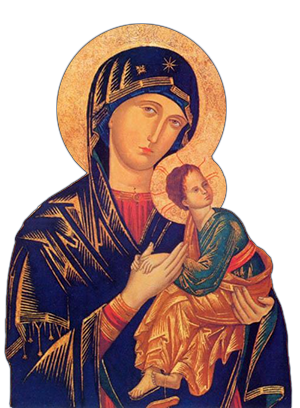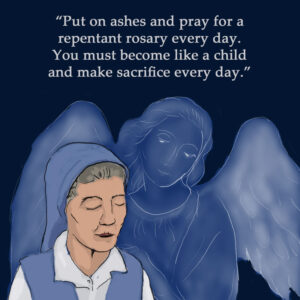Fr. Mitch Pacwa’s homily for Wednesday, September 16th, 2020
Today we celebrate two martyrs: St. Cornelius, who is pope of Rome and St. Cyprian who was the bishop of the city of Carthage, which is on the coast of North Africa; a very ancient city from the 800s BC that have been destroyed by the Romans and remade then into a Roman city. It was very prosperous; wonderful harbors, lots of wealth in the area, lots of trade.
They had different lives. We do not know a lot about Cornelius’s early life but from the way that he writes, he did not come from a very well educated family. He was not a good writer. His Latin is fairly popular and not so good a quality.
Cyprian, on the other hand came from a very wealthy family, he got a great education, his Latin was the best in the Early Church, until the time of Jerome and Augustine, 100 years later. And he apparently had done well as a lawyer and he lived a very immoral life; loose living and having lots of money, good education, good family, nice house, attracted a lot of ladies apparently, and in this he found, as so many do, the emptiness of it; the hollowness.
He was a good thinker as well as a good writer, and as he thought this through, he eventually was converted to Christianity. In fact, he took the name of the priest that baptized him and brought him to explain the faith. He was elected by popular acclamation as bishop, not long after his reception into the Church; his baptism. His qualities were such that people recognized his leadership. But he did not know exactly what he was getting into–Cornelius did.
Cornelius grew up in Rome where there had been persecutions, and–it is a very interesting thing–just a couple of years before the persecutions by the emperor Decius, Rome celebrated its 1000th anniversary as a city. For a thousand years it had existed. And there was great celebration and games and all sorts of–in fact, the emperor at the time of the anniversary stopped any persecution, but Decius insisted on it. And the Pope before Cornelius was not only martyred, but the emperor would not allow any election of a new pope for 14 months. Only when he went off to war was Cornelius elected.
And during the persecution both in Carthage and in Rome, a lot of people gave in to the Roman government.
It sounded really good: “yeah, I will stand up for Christ and I’ll die for him,” until it came along. And with the tortures, and the confiscation of property, and horrible tortures that were done against the Christians; burning them alive and things like this, these scared people, and a lot of people offered the incense to the Roman gods. A lot of them gave up. “It is just a little bit of incense; I do not mean to but I will just do it.” And the Romans did not care if you meant it or not; they just wanted you to show that kind of worship, by putting a few grains of incense, and then you got this libellus; a letter saying “yes, he gave the incense and he’s okay.”
Because they saw the Christians who would not worship Roma, the goddess of Rome, and would not worship the other gods, as dangerous to the Empire.
Just as people who see Christians that oppose policies in our own time, that go against our morality, on any level, they see us as a threat. So also did the Romans see the Christians of their day, and a lot of Christians had just given up.
Now, this led to a new problem: what do you do when Decius dies in battle, which he did, and the persecution is over? What do you do with the people who offered the incense to the Roman gods? People who were unfaithful to Christ? Unfaithful to his morals? Unfaithful to his doctrine? Sometimes giving up the sacred books? What do you do?
And there were three approaches. One was led by a priest named Novatian. Novatian said they cannot be forgiven. The only way they can ever come back to the Church is they have to be baptized again, do penance, go through the Catechumen, because they are not Christian at all, because they gave up the Faith and denied the Faith. Re-baptism is necessary, otherwise there is no forgiveness for you.
On the other hand there is another priest, Novatus, and he said just give them a little penance and let them come back. It wasn’t that big a deal. They didn’t really mean it. So you had one group, extremely strict, the other group–also led by a priest and some bishops–who were extremely lax. They went two directions.
Pope Cornelius said, “neither one of these is right.”
Christ brings mercy, but you also have to show the fruits of repentance. Mercy is a free gift from God but it is not cheap. It took the death of God the Son on the cross in order to win for us mercy. It is not cheap but it is free. It is an expensive gift of the blood of God the Son, crucified for us. And that most precious gift of all calls for us a sign that we really do repent. And there has to be something of a cleansing on the inside of that which would have been the block to fidelity in the first place. Often times, it is the fear of pain and torture and sometimes the fear of loss of material goods.
How often do people make immoral decisions on the basis of, what will people say about me? Or, I cannot afford to do what is right; I will just cheat a little.
How often do those kind of things get said about those thinking about abortions? “Well, you do not want people talking about you” or “you are too young to raise a child.” Often times that is true.
And it comes in so many other ways; corruption by politicians and business people. That it is, “well, it is not a big deal,” and, “the government will not miss a little bit of the tax money.” Or, “I can take care of these figures,” and so on. And it goes on in all parts of life. And the acts of penitents are there to help us realize, I could have acted rightly, I could have acted in accord with the righteousness of God. I could have done as St. Paul says today, I could have shown a type of love that wouldn’t be jealous, wouldn’t be worried about these other things, but would be faithful. I could’ve done that.
The time of repentance is there for that reflection and also learning to let go of the attachments in life, to which I think, “I have got to cling onto this, I have to do this. This is my identity. This is what is important to me. This is what is essential to me,” when it is not. And, often times, it is the vanities of this world, like Cyprian wrote about frequently, that keeps us from doing what is right.
That is why Pope Cornelius called for repentance, but forgiveness, not re-baptism, one baptism–St. Paul teaches that; you do not get re-baptized. There is one baptism. You can confess your sins and be absolved, but if you are baptized that is once and for all. That is as we teach it in the Catechism and we get this from St. Paul; an indelible seal in the soul, there is an impression, a character, a mark in our souls that is given to us by virtue of our baptism and confirmation, and for us priests in ordination; that is indelible; it never changes. So you do not redo that, but you can repent and confess, and find reconciliation, as Christ empowered the Apostles.
Novation taught the opposite of Christ. You can’t be forgiven by a priest, you can’t do it. It is done. Whereas Novatus went the opposite direction and said, “you do not need to have it done, it’s okay, don’t worry about it. Just do a little act of penance and say you are sorry.” No, there needs to be a deeper change.
And St. Cyprian agreed with Pope Cornelius 100%. That the way of Catholicism is not to go to these extremes, and we see this in today’s Gospel. Some people say, well, we sang a dirge for you. We made it real easy for you. Others say, “we sang a type of song for you to dance, make it easy,” or, “we sang a dirge, life is miserable.” And people do not respond to either one.
It is the teachings of Christ to which you respond, not to rigorous extremes on one side and lax extremes. The antidote to being lax in faith, the antidote to being lax in morals is not rigorism but the truth of Christ. And you don’t try to outdo Christ or under-do Christ, you follow Christ.
Like Moses said to the people of Israel; veer neither to the right nor to the left. Right now we have a time in our culture and often times people of the Church are careening like a drunk driver from one side to the other. And the culture is suffering as a result. And we are called by the example of the saints who laid down their lives. As a matter fact, despite the persecution, one of the things that happened in North Africa was a plague–probably smallpox–that is what some of the epidemiologists thought–because it is a disease carried by North African gerbils, and somebody somehow got it, and it spread all over North Africa. And St. Cyprian’s response was to take all the money he had from his family and open the first hospital.
At this period of time, only the rich could afford to go to the doctor, there were very few of them. But St. Cyprian invented the concept of the hospital. And the Christians took care of the sick. They did not–it says in today’s reading from Paul–they did not gloat over the suffering of the Gauls. “See, you persecuted us and now you got this plague and it is your fault. We will sit here and watch you die.” No! That is not love. They lived out the love as Christ taught and went to open a hospital and took care of all of the sick. That is when you see the pagan writers saying, see how they love, not only one another, but us.
This staying in the Gospel and staying true to the person of Christ without the extremes that are driving our culture crazy–so that people are rejoicing when police sitting in a car are shot in the face…lack of love. this is something where we are to be folks who want to rush to be there for them to reconcile the sinners but never saying that the sin is okay. You do not say that the sin is okay. It is not okay. It is not good. It is not, “well, the law says it is all right.” No. The law is wrong. Christ is right. And we stay with him, the way Cornelius and Cyprian did.



